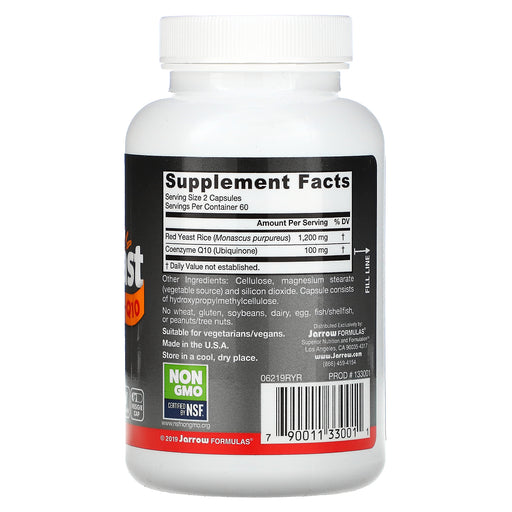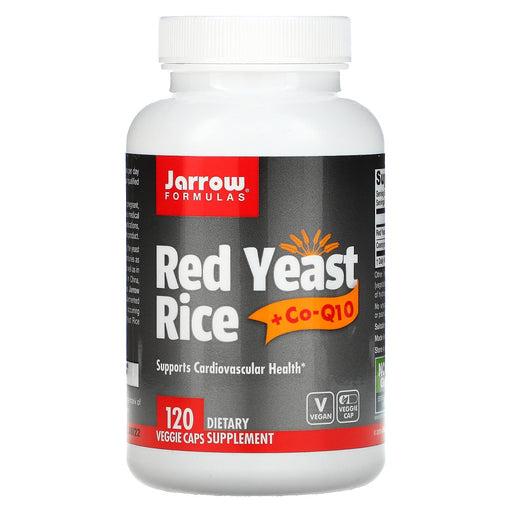
Support Healthy Cholesterol Levels with Red Yeast Rice Supplements
Red yeast rice is a natural supplement derived from a unique strain of yeast (Monascus purpureus) that grows on rice. It has been used in traditional Chinese medicine for centuries to support cardiovascular health and maintain healthy cholesterol levels. By incorporating red yeast rice supplements into your wellness routine, you can help promote optimal lipid balance and overall heart health.
What is Red Yeast Rice?
Red yeast rice is created by fermenting a specific type of yeast (Monascus purpureus) on rice, which results in the production of a group of compounds called monacolins. The most notable of these compounds is monacolin K, which is chemically identical to the active ingredient in the prescription cholesterol-lowering drug lovastatin.
Monacolin K works by inhibiting the activity of the enzyme HMG-CoA reductase, which is responsible for producing cholesterol in the liver. By reducing the liver's cholesterol production, red yeast rice can help lower total cholesterol, LDL (bad) cholesterol, and triglyceride levels, while maintaining or slightly increasing HDL (good) cholesterol levels.
In addition to monacolins, red yeast rice also contains other beneficial compounds, such as unsaturated fatty acids, phytosterols, and isoflavones, which may contribute to its cardiovascular health benefits.
Benefits of Red Yeast Rice Supplementation
Incorporating red yeast rice supplements into your health regimen may offer several potential benefits, including:
- Maintaining Healthy Cholesterol Levels: The monacolins in red yeast rice, particularly monacolin K, have been shown to help lower total cholesterol, LDL cholesterol, and triglyceride levels, while maintaining or slightly increasing HDL cholesterol levels, thereby supporting overall lipid balance and cardiovascular health.
- Supporting Heart Health: By helping to maintain healthy cholesterol levels, red yeast rice supplements can support overall heart health and reduce the risk of cardiovascular issues.
- Antioxidant Properties: Red yeast rice contains antioxidant compounds, such as isoflavones and unsaturated fatty acids, which may help protect cells from oxidative stress and support overall cardiovascular health.
- Complementing a Heart-Healthy Lifestyle: When used in conjunction with a balanced diet, regular exercise, and other heart-healthy lifestyle habits, red yeast rice supplements can provide additional support for maintaining optimal cardiovascular well-being.
Choosing the Best Red Yeast Rice Supplement
When selecting a red yeast rice supplement, consider the following factors to ensure you choose a high-quality product that meets your needs:
- Standardized Monacolin K Content: Look for supplements that provide a standardized amount of monacolin K, typically ranging from 5-10 mg per serving, to ensure consistent efficacy and safety. Some high-quality red yeast rice supplements will also contain complementary nutrients like CoQ10 to support overall cardiovascular health.
- Purity and Quality: Choose supplements that are manufactured by reputable brands, free from contaminants like citrinin (a potentially harmful byproduct of the fermentation process), and third-party tested for purity and potency.
- Brand Reputation: Select supplements from trusted brands with a history of producing high-quality, science-backed red yeast rice products and a commitment to transparency and safety.
- Synergistic Ingredients: Consider supplements that combine red yeast rice with other heart-healthy nutrients, such as CoQ10, omega-3 fatty acids, or plant sterols, for a more comprehensive approach to cardiovascular support.
- Doctor's Recommendation: Consult with your healthcare provider before starting any red yeast rice supplement, especially if you have pre-existing health conditions, are taking medications, or have a family history of cardiovascular issues.
Maximizing the Benefits of Red Yeast Rice Supplements
To get the most out of your red yeast rice supplement, consider the following tips:
- Follow Dosage Instructions: Always adhere to the recommended dosage on the product label, and do not exceed the suggested daily intake without consulting your healthcare provider.
- Pair with a Heart-Healthy Lifestyle: While red yeast rice supplements can provide valuable support for maintaining healthy cholesterol levels, they should be used in conjunction with a balanced, heart-healthy diet rich in fruits, vegetables, whole grains, lean proteins, and healthy fats, as well as regular exercise and stress management techniques.
- Monitor Cholesterol Levels: Have your cholesterol levels checked regularly by your healthcare provider to monitor your progress and ensure that the red yeast rice supplement is working effectively for you.
- Be Aware of Potential Interactions: Red yeast rice may interact with certain medications, particularly those used to lower cholesterol, such as statins. Always inform your healthcare provider about all the supplements and medications you are taking to avoid potential interactions.
- Store Properly: Keep your red yeast rice supplement in a cool, dry place, away from direct sunlight and moisture, to maintain its potency and freshness.
Support Cardiovascular Health with Red Yeast Rice Supplements
If you're looking for a natural way to support healthy cholesterol levels and overall cardiovascular well-being, red yeast rice supplements may be a valuable addition to your wellness routine. By harnessing the power of monacolins and other beneficial compounds, red yeast rice can help you maintain optimal lipid balance and promote long-term heart health.
Witness the potential of this traditional Chinese medicine staple by exploring our curated selection of high-quality red yeast rice supplements. With a commitment to purity, efficacy, and your individual needs, Health Orchard is here to support you on your journey towards optimal cardiovascular health and overall well-being. Always be sure to include heart-healthy nutrients like CoQ10, omega-3 fatty acids, and B vitamins for a comprehensive heart health supplement plan.
Frequently Asked Questions about Red Yeast Rice
1. What is red yeast rice supplement good for?
Red yeast rice is a traditional Chinese medicine and dietary supplement known for its potential to lower cholesterol levels. It contains compounds called monacolins, particularly monacolin K, which is chemically identical to the active ingredient in the prescription drug lovastatin. Red yeast rice supplements are primarily used to support cardiovascular health by:
- Lowering LDL (bad) cholesterol levels
- Reducing total cholesterol levels
- Supporting healthy blood lipid levels
- Promoting overall heart health
2. Are there any bad side effects to taking red yeast rice?
Red yeast rice supplements are generally well-tolerated, but some people may experience side effects similar to those associated with statin drugs. These may include:
- Digestive discomfort (e.g., nausea, bloating, gas)
- Headaches
- Dizziness
- Muscle pain or weakness
- Skin rash or itching
In rare cases, red yeast rice may cause more severe side effects, such as liver damage or rhabdomyolysis (severe muscle breakdown). If you experience persistent or severe side effects, discontinue use and consult with a healthcare professional.
3. How much red yeast rice should you take daily for cholesterol?
The recommended dosage of red yeast rice for cholesterol management varies depending on the specific product and its monacolin K content. Most studies have used doses ranging from 1,200-2,400 mg of red yeast rice per day, typically divided into two or three doses. However, it is essential to follow the dosage instructions on the product label and consult with a healthcare professional before starting a red yeast rice supplement regimen to ensure the proper dosage for your individual needs.
4. What vitamins should not be taken with red yeast rice?
Red yeast rice may interact with certain vitamins and supplements, potentially increasing the risk of side effects or reducing the effectiveness of the supplements. Some examples include:
- Coenzyme Q10 (CoQ10): Red yeast rice may deplete CoQ10 levels in the body, so it is often recommended to take a CoQ10 supplement alongside red yeast rice
- Niacin: Taking red yeast rice with high doses of niacin may increase the risk of muscle-related side effects
- Grapefruit or grapefruit juice: Compounds in grapefruit may interact with red yeast rice and increase the risk of side effects
It is essential to consult with a healthcare professional before combining red yeast rice with other supplements to avoid potential interactions and ensure safety.
5. Is red yeast rice safe for kidneys?
Red yeast rice is generally considered safe for kidney health when taken in recommended doses. However, as with statin drugs, there is a potential risk of kidney damage, particularly in people with pre-existing kidney problems or those taking high doses of red yeast rice. If you have kidney issues or concerns about kidney health, it is crucial to consult with a healthcare professional before taking red yeast rice supplements to ensure they are safe and appropriate for your individual needs.
6. What is the best red yeast rice supplement?
The best red yeast rice supplement may vary depending on individual needs and preferences, but some key factors to consider when choosing a product include:
- Standardized monacolin K content: Look for supplements that specify the amount of monacolin K per serving to ensure consistent dosing
- Third-party testing: Choose products that have been independently tested for quality, purity, and potency
- Reputation of the manufacturer: Select supplements from reputable brands with a history of producing high-quality products
- Purity and ingredients: Opt for supplements free from artificial additives, fillers, or potential allergens
Some well-regarded red yeast rice supplements include Thorne Research Choleast, Life Extension Red Yeast Rice, and NOW Foods Red Yeast Rice. However, it is essential to consult with a healthcare professional to determine the best supplement for your individual needs.










